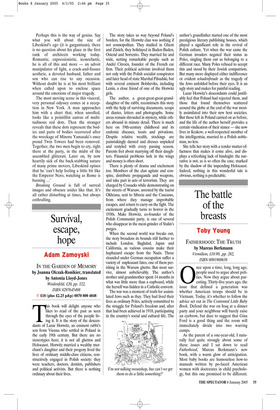Survival, escape, hope
Adam Zamoyski
IN THE GARDEN OF MEMORY by Joanna Olczak-Ronikier, translated by Antonia Lloyd-Jones Weidenfeld, £20, pp. 322, ISBN 0297645498 ✆ £18 (plus £2.25 p&p) 0870 800 4848 This book will delight anyone who likes to read of the past as seen through the eyes of the people living it. It is the story of the descendants of Lazar Horwitz, an eminent rabbi’s son from Vienna who settled in Poland in the early 19th century. But there are no stereotypes here; it is not all ghettos and Holocaust. Horwitz married a wealthy merchant’s daughter and their progeny lived the lives of ordinary middle-class citizens, constructively engaged in Polish society: they were teachers, doctors, dentists, publishers and political activists. But there is nothing ordinary about their lives. The story takes us way beyond Poland’s borders, for the Horwitz clan was nothing if not cosmopolitan. They studied in Ghent and Zürich, they holidayed in Baden-Baden, Ostend and Sorrento. They married far and wide, netting remarkable people such as André Citroën, founder of the French car firm. Their political activism involved them not only with the Polish socialist conspirator and later head of state Marshal Pilsudski, but with several eminent Bolsheviks, including Lenin, a close friend of one of the Horwitz girls.
The author, a great-great-great-granddaughter of the rabbi, reconstructs this story with the help of surviving documents, scraps of diaries, letters and photographs. Some areas remain shrouded in mystery, while others abound in minute detail. There is much here on 19th-century childhood and its endemic diseases, treats and privations. Despite relative wealth, stockings are painstakingly darned and dresses unpicked and restyled with every passing season. Parents fret about marrying off their daughters. Financial problems lurk in the wings and money is often short.
There is plenty of drama and excitement too. Members of the clan agitate and conspire, distribute propaganda and weapons, and take part in acts of terrorism. They are charged by Cossacks while demonstrating on the streets of Warsaw, arrested by the tsarist Okhrana, sent to Siberia and the Caucasus, from where they manage improbable escapes, and return to carry on the fight. The excitement gradually turns to horror in the 1930s. Maks Horwitz, co-founder of the Polish Communist party, is one of several who disappear in the meat-grinder of Stalin’s purges.
When the second world war breaks out, the story broadens its bounds still further to include London, Baghdad, Japan and California, as various cousins make their haphazard escape from the Nazis. Those stranded under German occupation suffer a variety of unpleasant fates, one of them perishing in the Warsaw ghetto. But most survive, almost unbelievably. The author’s mother and grandmother spent 14 months in what was little more than a cupboard, while she herself was hidden in a Catholic convent.
The war was a moment of truth for assimilated Jews such as they. They had lived their lives as ordinary Poles, actively committed to the struggle for Poland’s freedom and, after that had been achieved in 1918, participating in the country’s social and cultural life. The author’s grandfather started one of the most prestigious literary publishing houses, which played a significant role in the revival of Polish culture. Yet when the war came the German invaders negated their status as Poles, singling them out as belonging to a different race. Many Poles refused to accept this and stood by their Jewish compatriots. But many more displayed either indifference or evident schadenfreude as the tragedy of the Jews unfolded before their eyes. It is an ugly story and makes for painful reading.
Lazar Horwitz’s descendants could justifiably feel that Poland had rejected them, and those that found themselves scattered around the globe at the end of the war mostly assimilated into their new host societies. But those left in Poland carried on as before, and the life of the author herself provides a certain vindication of their stance — she now lives in Krakow, a well-respected member of the intelligentsia, married to a Polish nobleman, no less.
She tells her story with a tender matter-offactness that makes it come alive, and displays a refreshing lack of hindsight: the narrative is not, as is so often the case, marked by the shadow of the impending Holocaust. Indeed, nothing in this wonderful tale is obvious, nothing is predictable.










































 Previous page
Previous page